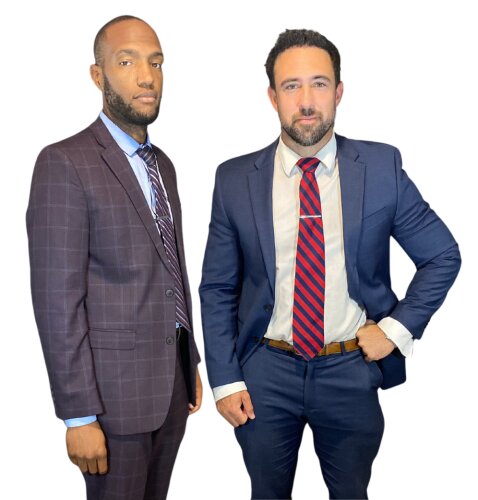Best White Collar Crime Lawyers in Florida
Share your needs with us, get contacted by law firms.
Free. Takes 2 min.
Or refine your search by selecting a city:
List of the best lawyers in Florida, United States
About White Collar Crime Law in Florida, United States
White collar crime refers to non-violent, financially motivated offenses, typically committed by professionals or individuals in business or government. In Florida, white collar crimes often involve deception, fraud, or a breach of trust for financial gain. These crimes can range from embezzlement and healthcare fraud to identity theft and securities violations. Accusations or charges of white collar crime can lead to severe penalties, including imprisonment, hefty fines, asset forfeiture, and lasting damage to one's reputation and career.
Why You May Need a Lawyer
If you are under investigation or have been charged with a white collar crime in Florida, obtaining an attorney is critical. Common reasons you might need legal help include:
- Facing federal or state criminal investigations or charges
- Having law enforcement execute a search warrant at your home or business
- Receiving a subpoena or target letter from authorities
- Being accused by an employer, customer, or regulator of financial misconduct
- Working in industries prone to white collar offenses, such as banking, real estate, or healthcare
- Needing guidance through government audits or regulatory reviews
- Negotiating plea deals or voluntarily disclosing information to authorities
Lawyers experienced in white collar defense can help you understand your rights, develop a robust legal strategy, protect your interests in court, and potentially resolve matters before formal charges are filed.
Local Laws Overview
Florida has established comprehensive laws targeting various forms of white collar crime, both at the state and federal level. Key aspects include:
- Florida White Collar Crime Act: This statute defines and penalizes patterns of criminal activity involving multiple offenses, known as "aggravated white collar offenses."
- Fraudulent Practices: Laws cover fraud involving securities, insurance, mortgages, healthcare, and government benefits.
- Theft and Embezzlement: Florida prosecutes theft by deception or conversion of property and funds from businesses or organizations.
- Forgery and Counterfeiting: The state penalizes the creation, use, or possession of forged documents or counterfeit goods.
- Identity Theft: Florida is strict about crimes involving unauthorized use of others' personal information to obtain credit, goods, or services.
- Money Laundering: Moving, concealing, or handling funds derived from unlawful activity is a serious state and federal offense.
White collar crime cases often involve both Florida law and federal statutes, such as those covering tax evasion, wire fraud, and mail fraud. Conviction may bring mandatory prison sentences and long-lasting collateral consequences.
Frequently Asked Questions
What is considered a white collar crime in Florida?
White collar crime typically includes non-violent offenses like fraud, embezzlement, bribery, identity theft, forgery, and other acts involving deceit for financial gain.
Can white collar crimes be charged at both the state and federal level?
Yes, many white collar offenses violate both state and federal laws. This means that a person can face charges in Florida courts, federal courts, or both, depending on the nature and scope of the alleged conduct.
What are the potential penalties for white collar crimes in Florida?
Penalties can include substantial fines, restitution, probation, asset forfeiture, and prison sentences. Aggravated or repeated offenses often result in harsher punishments.
How does Florida define "aggravated white collar crime"?
Under the Florida White Collar Crime Act, an aggravated white collar offense involves committing two or more specified felonies that target multiple victims or cause a significant loss, triggering enhanced penalties.
What agencies investigate white collar crimes in Florida?
Investigations can be led by state agencies like the Florida Department of Law Enforcement and, for federal crimes, by agencies such as the FBI, IRS, SEC, and Department of Justice.
Is it possible to resolve a white collar case without going to trial?
Yes, many cases are resolved through plea agreements, pre-trial diversion, settlements, or by convincing prosecutors not to file charges after investigation.
Can a white collar crime conviction impact my professional license?
Yes, conviction for fraud or related crimes can lead to suspension or revocation of licenses for professionals in fields like law, healthcare, accounting, and finance.
What should I do if I believe I am under investigation?
You should consult a white collar crime attorney immediately. Avoid speaking to investigators or destroying any records without legal guidance.
Are restitution payments always required in white collar cases?
Florida courts often require defendants to pay back victims as part of sentencing, especially when the crime involved financial harm.
How long does a white collar crime case typically take to resolve?
Timelines vary widely. Some investigations conclude within months, while complex cases can take years, especially those involving multiple defendants or substantial evidence review.
Additional Resources
Several organizations and governmental bodies provide information and assistance related to white collar crime in Florida:
- Florida Department of Law Enforcement (FDLE)
- Florida Office of the Attorney General
- Federal Bureau of Investigation (FBI)
- United States Department of Justice (DOJ)
- Securities and Exchange Commission (SEC)
- Florida Bar Association Lawyer Referral Service
- Local legal aid organizations
Next Steps
If you are under investigation or have been charged with a white collar crime in Florida, take these important steps:
- Do not speak to law enforcement or investigators without a lawyer present
- Consult a qualified attorney with experience in white collar defense as soon as possible
- Collect and preserve all relevant documents and records
- Follow your lawyer's advice and refrain from discussing your case with others
- If you have received a subpoena or target letter, seek legal counsel before responding
Prompt legal assistance can make a significant difference in the outcome of your case. An experienced attorney can protect your rights, explore all available defenses, and guide you through the legal process.
Lawzana helps you find the best lawyers and law firms in Florida through a curated and pre-screened list of qualified legal professionals. Our platform offers rankings and detailed profiles of attorneys and law firms, allowing you to compare based on practice areas, including White Collar Crime, experience, and client feedback.
Each profile includes a description of the firm's areas of practice, client reviews, team members and partners, year of establishment, spoken languages, office locations, contact information, social media presence, and any published articles or resources. Most firms on our platform speak English and are experienced in both local and international legal matters.
Get a quote from top-rated law firms in Florida, United States — quickly, securely, and without unnecessary hassle.
Disclaimer:
The information provided on this page is for general informational purposes only and does not constitute legal advice. While we strive to ensure the accuracy and relevance of the content, legal information may change over time, and interpretations of the law can vary. You should always consult with a qualified legal professional for advice specific to your situation.
We disclaim all liability for actions taken or not taken based on the content of this page. If you believe any information is incorrect or outdated, please contact us, and we will review and update it where appropriate.
Browse white collar crime law firms by city in Florida
Refine your search by selecting a city.














